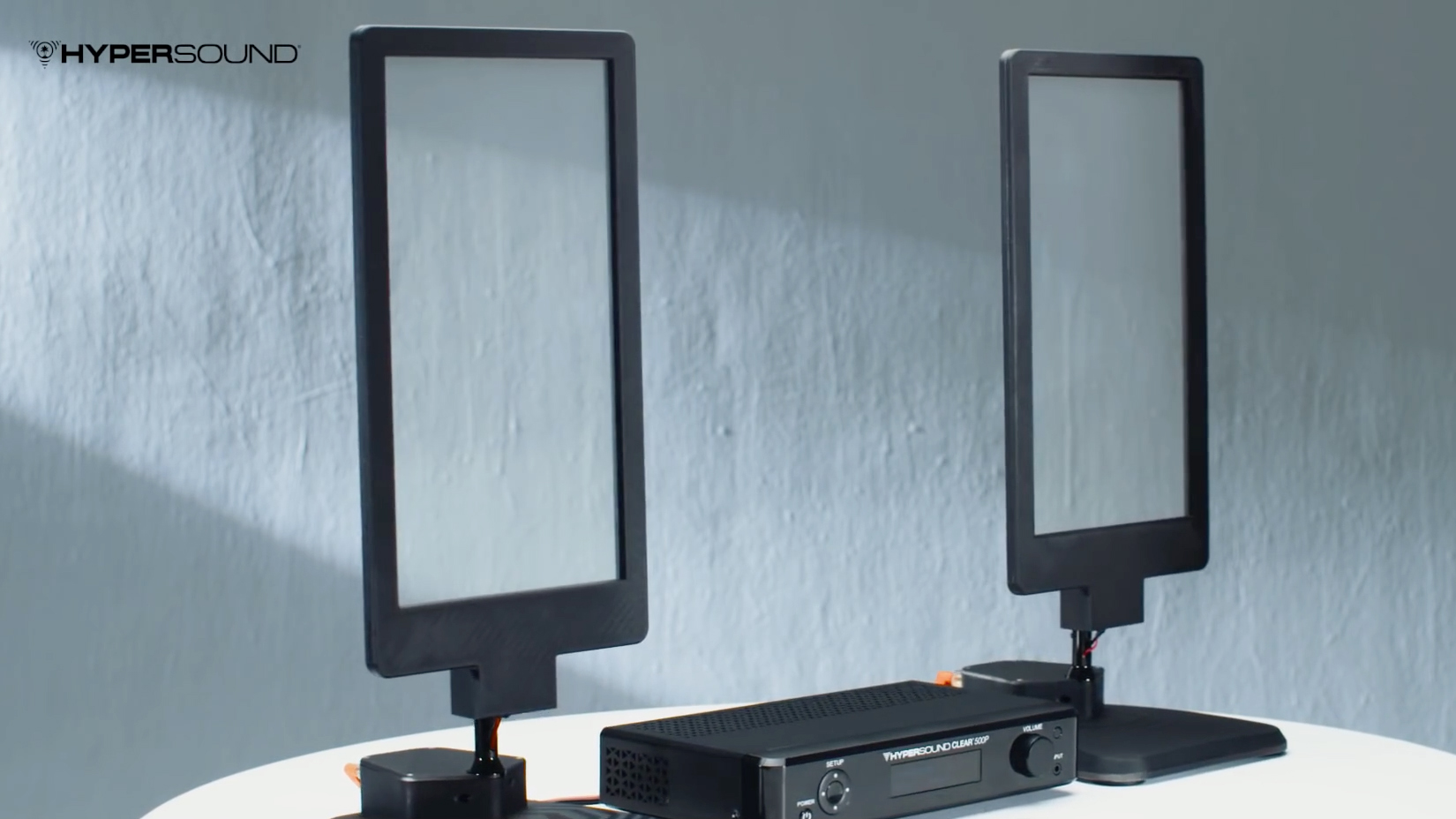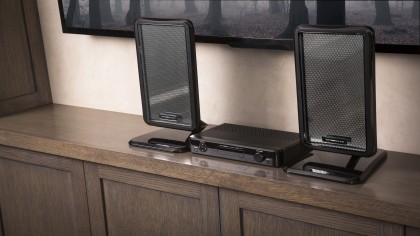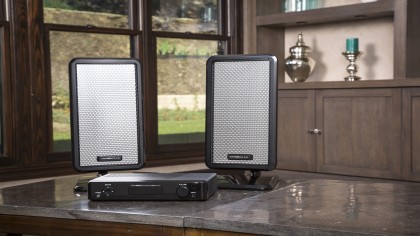
Soon you'll be able to turn up your speakers as loud as you like without disturbing a person sat just a couple of feet away, thanks to Turtle Beach's new glass directional speakers.
The directional speakers focus sound on a specific point, which allows you to hear sound that's practically inaudible to the rest of the room.
The glass construction results in a pair of futuristic looking speakers that look like a pair of free standing window panes.
The invention is especially useful for individuals who are hard of hearing, since it allows them to boost the volume on their speakers to make them audible, without disturbing those around them.
The National Institute on Deafness and Other Communication Disorders (NIDCD) estimates that about one in eight people aged 12 years and older have hearing loss in both ears, while about 15% of adults in America between 20 and 69 years old have high frequency hearing loss due to exposure to noise at work or during leisure activities.
Yeah, it sucks.
One last fact, and it's an important one: according to the NIDCD, among adults aged 20 to 69, approximately 16% who could benefit from wearing hearing aids have ever used one.
Get daily insight, inspiration and deals in your inbox
Sign up for breaking news, reviews, opinion, top tech deals, and more.
In short, there are a lot of us out there who probably need hearing aids and are just too brazen – or embarrassed – to use them.

Science and sound
Turtle Beach's solution uses precise beams of sound that carry additional mid and high frequencies to supplement traditional TV speakers.
It's unusual, yes, but also pretty impressive, and I got a chance to try out an earlier non-glass prototype a couple of months ago.
Beams of high-frequency sound might give off a far-fetched, sci-fi vibe, but they really do exist, and Turtle Beach is using the vehicle to transmit enhanced audio directly to your ears.
In a brief demo, Turtle Beach set up the two reflective sound emitters, a base station and a PS4. For the demo, representatives brought both the latest Transformers flick and James Cameron's Avatar on Blu-ray. Figuring that there'd be more details in Avatar, I went with that.

They rolled a chair into the middle of the room and pointed the emitters (the silver, mirror-looking devices you see above) towards it.
Before sitting down, I was asked to stand off to the side while the movie started. It sounded like it always had when I watched it in my own living room, minus the 7.1 surround sound. The audio was passable and the details were existent, though not totally immaculate.
Then, I was asked to sit in the chair. The difference was night and day.
The emitters created a directional beam of sound, focused on a singular point. They said the system is designed for most living rooms and could accurately reproduce sound for about 20 to 25 feet before experiencing diminished results.
Those sitting close to you, say, on a couch nearby would be capable of hearing the enhanced dialog and effects, but would need to mostly rely on the TV or whatever speaker you have hooked up for audio.
Dialog that I struggled to hear before and had just considered impossible to hear was now entirely understandable. I imagine how games like Call of Duty would sound with this level of clarity, and how many details I've missed out on over the years unknowingly.
The only problem I noticed is that it worked too well sometimes. Scenes with excessive yelling or gunfire came off as harsh and overwhelming – those details don't need enhancing.
However I was told that this sensitivity could be customized to your tastes and needs. If someone can hear moderately well, the HyperSound unit can be tuned to accentuate higher frequencies, like dialog, and leave the lower frequencies untouched.
Doctor recommended, gamer approved
The demonstration left me with one major question: "So, why isn't a technology that improves sound quality to this level getting any attention?"
Problematically, you can't go into Best Buy or log onto Amazon to buy a pair of the sound emitters. The only person with the hookup is your audiologist, a specialist who you might not even see unless your primary doctor noticed a severe decline in your hearing.
Plus, even if you did get the recommendation to see an audiologist, Hypersound (like any other medical device) is not cheap. But those are hangups that Turtle Beach wants to fix in 2016.
Already available in the US through audiological health specialists, the company recently got approval to start selling the system in Europe, and hopes to secure deals with regular consumer retailers here in the US to start putting units on store shelves. This in turn will help the manufacturer move more units and ultimately bring down the price from its current $1,675 (about £1,200, AU$2,200) price tag.

While my demo was spent mostly talking about how aging gamers would benefit from the sound emitter system, Turtle Beach is also targeting retailers directly – arguing that directed sound makes for more engaging displays in stores – and businesses that want their employees to freely listen to music without the need for headphones.
These ideas are practical, of course, but obviously less fun and convenient than using HyperSound Clear to improve the in-home cinema experience for those that are struggling to hear the TV.
HyperSound Clear is an interesting technology and makes for an impressive demo. At its current price and availability, however, it's not something I can picture anyone running to the doctor to request.
But, a cheaper, more accessible version for you and I might be the next step home entertainment takes toward the futuristic living room we've all been dreaming of.
More audio features:
Nick Pino is Managing Editor, TV and AV for TechRadar's sister site, Tom's Guide. Previously, he was the Senior Editor of Home Entertainment at TechRadar, covering TVs, headphones, speakers, video games, VR and streaming devices. He's also written for GamesRadar+, Official Xbox Magazine, PC Gamer and other outlets over the last decade, and he has a degree in computer science he's not using if anyone wants it.
